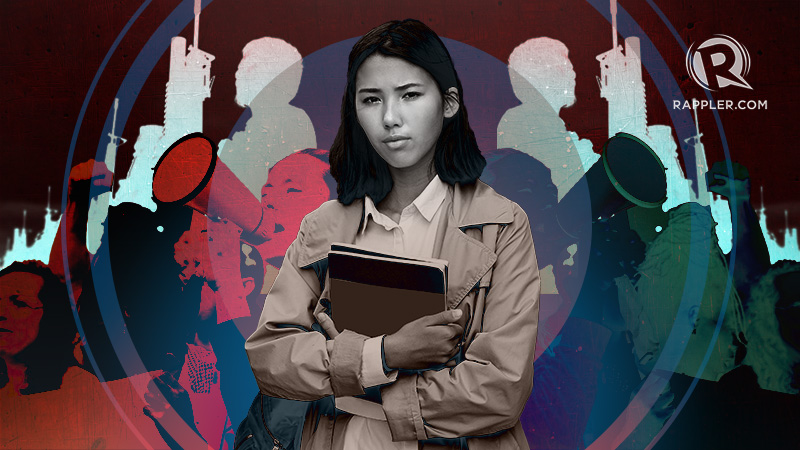

The scene opens with a young boy named Paco having a conversation with his father, a farmer in the rice fields of Nueva Ecija. The father reminds Paco to study hard because life as a farmer is difficult, and education will be Paco’s key to a better life.
You feel Paco’s sincerity and desire to make a better life for his tatay, and he goes to school full of energy and drive. Then Paco’s friends join him onstage, telling him that classes are canceled because there is a rally at school. A teacher comes in condemning rallies, saying they do not solve anything. However, one of Paco’s friends begins a passionate speech about how rallies provide an avenue for the masses to air their issues against the government.
Moved by such passion, Paco and his group of friends join the rally, which eventually becomes violent. The next scene shows how Paco’s friend was in fact a member of the NPA, and that he was tasked to do more recruiting. Eventually, Paco and his friends join the NPA movement, get into an encounter with soldiers, get shot, but then seemingly get saved by the same soldiers.
The play ends with Paco realizing that education is important and rallies are bad.
This is the play that welcomed a group of student leaders at one of the Philippine Army's learning camps. After the performance, a soldier came onstage and asked the students what they learned from the activity. The students just told them what they wanted to hear: rallies are bad; stay in school so you can be intelligent; there is nothing wrong with the government so let us not rally. (READ: CHR reminds government: Activism is a right)
It was disturbing how the army made the extreme argument that when you criticize your government, you are against it. They plan to bring this narrative to schools, and it is alarming that they are trying to influence young people not to be critical of the government, and more importantly, not to think. (READ: [OPINION] Activism as the foundation of the university)
As someone working in student development, my knee-jerk reaction was to criticize the performance, to tell those soldiers then and there that they had no business staging a play filled with such disinformation. However, I realized that perhaps these soldiers were also just passionate about their cause, had some talent they wanted to share, and perhaps, maybe, had limitations crafting a performance with a more comprehensive and thorough narrative because of certain limits.
Or perhaps they were just following orders and were in fact a small part of a larger propaganda movement by the powers that be.
Regardless of their intentions, though, there is an apparent trend of men and women in uniform entering schools and providing information campaigns, from discouraging drug use to demonizing criticism of the government.
So what then should educators and formators do in light of what some would dub as the "militarization" of schools? How then can those in the academe stay true to their mission of forming the critical consciousness of this generation? These are the questions that disturb me every day since witnessing Paco’s story.
While there may be no hard and fast rule as to what the best strategies are to counter these efforts, for now, perhaps, an attempt at collaboration might be worth a try. That way, those with more expertise could also give feedback to our uniformed agencies so that the messaging they share to the young becomes more thorough, more factual, and more sincere. That way they do not rob the young of the opportunity to think and arrive at their own truths, but empower them with tools to think critically – to analyze a set of facts and various perspectives. (READ: [OPINION] Activism is not a waste of time)
At the end of the day, we just might need to collaborate, compromise, and hopefully find common ground, because if there one truth common to all, it’s that we are all Filipinos doing our very best to serve this country we love. – Rappler.com
Gian Bermudo is one of the fellows of DAKILA’s Heroes Hub Youth Fellowship Program. She is an educator who is very interested about learning development practices and innovations, responsible adolescent sexuality and social development. Gian was a Regional Awardee of the Ten Outstanding Students of the Philippines in 2012.
This piece is part of a series by youth leaders from #WeTheFuturePH, a nonpartisan movement of Filipino youth standing up for rights, freedom, and democracy.